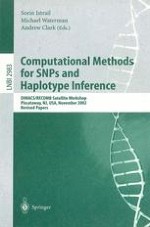2004 | OriginalPaper | Buchkapitel
Haplotype Inference and Its Application in Linkage Disequilibrium Mapping
verfasst von : Tianhua Niu, Xin Lu, Hosung Kang, Zhaohui S. Qin, Jun S. Liu
Erschienen in: Computational Methods for SNPs and Haplotype Inference
Verlag: Springer Berlin Heidelberg
Enthalten in: Professional Book Archive
Aktivieren Sie unsere intelligente Suche, um passende Fachinhalte oder Patente zu finden.
Wählen Sie Textabschnitte aus um mit Künstlicher Intelligenz passenden Patente zu finden. powered by
Markieren Sie Textabschnitte, um KI-gestützt weitere passende Inhalte zu finden. powered by
Haplotypes, defined as a set of DNA polymorphism markers physically located on a single chromosome, have gained exploding magnitude of interest owing to its potential value in disease gene identification and in pharmacogenomics. Because molecular haplotyping methods remain too costly to be used on a regular basis, statistical techniques for haplotype inference have emerged as the most time- and cost-efficient approach. This chapter explains the statistical theory and algorithms behind several in silico haplotype phasing strategies; reviews the partition-ligation idea for dealing with a large number of linked SNP marker loci; and proposes new methods for handling genotype uncertainty in the genotyping machine output as well as the pooled marker data. We also discuss the application of haplotype information in disease mutation detection in case-control designs and the impact of haplotype information on locus estimation accuracy. As an illustration, we applied the haplotyping tool PL-EM jointly with the LD mapping algorithm BLADE to a case-control study of the SNP markers surrounding the Alzheimer disease susceptible gene APOE.
